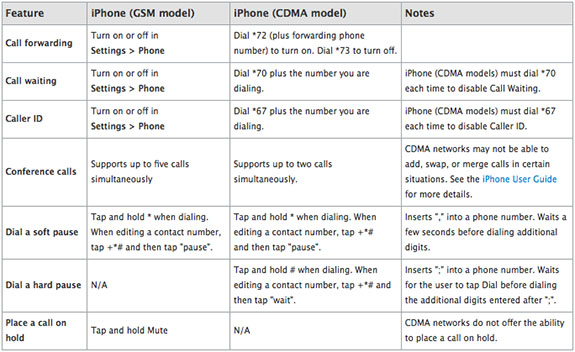Submitted by Bob Bhatnagar on
Apple has released detailed support information explaining the differences between iPhone calling features on the AT&T and Verizon networks. Because AT&T Mobility uses GSM technology and Verizon Wireless has a CDMA network, each iPhone 4 has different calling capabilities. Recently it was revealed that Verizon's network suffers from conference calling limitations, but there are other differences as well. The table below was released by Apple to illustrate the details.

Essentially, CDMA and GSM networks have different capabilities when it comes to call forwarding, call waiting, caller ID, conference calls, hold behavior and inserting pauses when dialing. Of course another major change is that the Verizon iPhone 4 doesn't have a SIM card. This means that all SIM functionality such as enabling a SIM PIN, selecting a carrier network or editing an APN and importing SIM contacts are impossible on the Verizon iPhone.
Many features can be accessed on the GSM iPhone 4 with AT&T via Settings menus. For example, call forwarding, call waiting and caller ID can be switched ON or OFF using Settings -> Phone. In contrast, the Verizon iPhone 4 requires a series of codes to activate these features. Call forwarding can be turned on by dialing *72 followed by the forwarding phone number. To turn off call forwarding dial *73.
Users can only turn off call waiting or caller ID on the Verizon iPhone on a specific phone call. Each time the code must be dialed before the phone number when calling (*70 to block call waiting and *67 to block caller ID). These limitations of the CDMA network and the other differences listed in Apple's support document will soon be old news, as Verizon and AT&T are both moving to next generation 4G LTE technology.
Comments
Vicky replied on Permalink
It's totally impossible to "place a call on hold"?
Why can't any phone simply cut off the speaker and mic... and simulate the "hold" feature???
Why doesn't Apple claim the *NETWORK* can't/doesn't support it?